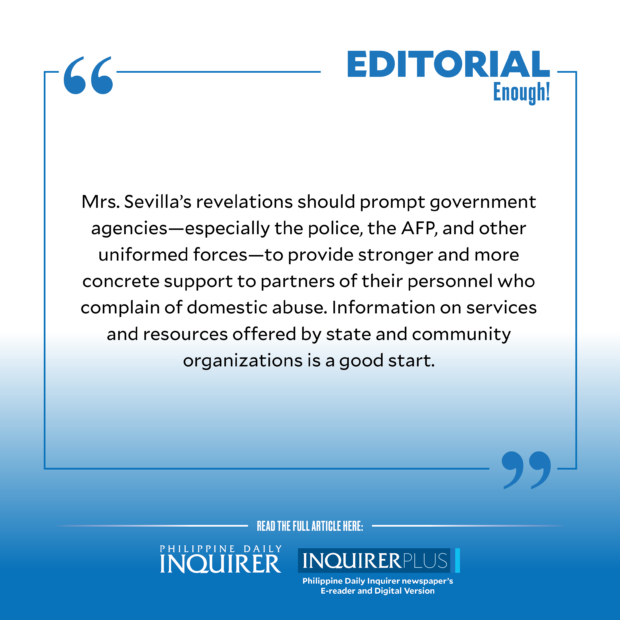
It took years, but early this week, the wife of an army general has had enough of her husband’s alleged philandering and physical, mental, and emotional abuse, and called him out in the most spectacular way: at the Senate during the confirmation hearing of his promotion, which was subsequently deferred.
“I can no longer stay silent … We deserve to be vindicated,” said Tessa Luz Aura Reyes-Sevilla, whose husband, Brig. Gen. Ranulfo Sevilla, is deputy commander of the Armed Forces of the Philippines-Special Operations Command.
Mrs. Sevilla accused her husband of abusing her and their two young children for years, and of scrimping on child support while flaunting his mistress and their “lavish” lifestyle on social media. She tearfully recalled being slapped repeatedly, hit with a suitcase when she tried to stop him from leaving the family, and pushed when she was pregnant.
‘Silent menace’
“He doesn’t deserve to be a general who should understand the [concept of] responsibility and accountability to the people because his position is a public trust,” she said of her estranged husband.
More surprising than such public accusation is how the woman found the courage to finally reveal what many often describe as a private matter, “usapang mag-asawa” that they shouldn’t meddle in, the main reason that domestic violence has remained under the radar—unless the battered spouse becomes seriously injured, dies, or commits suicide.
Society’s expectations of the wife holding the family together, the stigma and shame of being a separated woman, fears of the husband being arrested and losing his economic support, plus the possibility of losing custody of the children, are among the factors cited by women’s groups for this “silent menace” in intimate relationships.
Family violence
Laws and policies often put the responsibility on the victims to stand up to the violence or escape it. Little action is done by the state without the victim reporting the abuse which, in most instances, has eroded her confidence and self-worth to the point of putting the blame on herself instead of seeking help.
Less surprising is how the AFP appears to have ignored the complaint, despite its spokesperson Col. Francel Margareth Padilla insisting that the army “[seriously takes] all allegations and complaints pertaining to the protection of women and children.”
Such indifference may yet explain the results of a study abroad, suggesting that family violence is two to four times higher in the law-enforcement community than in the general population.
Old boys network
The study, “Estimating the rate of domestic violence perpetrated by law enforcement officers: A review of methods and estimates,” published by ScienceDirect.com in 2016, cites several reasons behind this. One is that law enforcement officers are trained on specific skills to help them command authority on the job which, exercised within an intimate relationship, can lead to physically violent situations.
Being disproportionately exposed to stress linked to apprehending felons, uniformed personnel may sometimes use the family as convenient outlet to release their frustrations with their job.
Their victims meanwhile face unique barriers that could compromise their security, including the abuser’s colleagues leaking the complaint to him and preempting her other options. With the old boys network firmly in place in law enforcement, officers often choose to shield the offender.
Abusive spouses
In this particular case, Mrs. Sevilla said she had previously sought the assistance of the AFP to compel her husband to provide them with enough financial support. She had also filed complaints at the Office of the Ethical Standards and Public Accountability in the Army headquarters in Fort Bonifacio, where she found out that at least 10 women go to the OESPA everyday to report their abusive spouses, only to be told “to just file cases in court.”
Mrs. Sevilla’s revelations should prompt government agencies—especially the police, the AFP, and other uniformed forces—to provide stronger and more concrete support to partners of their personnel who complain of domestic abuse. Information on services and resources offered by state and community organizations is a good start.
Psychiatric treatment
Much better is an extensive awareness campaign on Republic Act No. 9262 or the Anti-Violence Against Women and Children Act of 2004 which provides, among other provisions, that such abuse is considered a public crime so that anybody with personal knowledge of it can file a complaint, starting at the barangay level. Cases may be filed within 20 years after the commission of the violent act, with offenders facing imprisonment of up to 20 years and up to P300,000 in damages, plus mandatory psychiatric treatment.
It’s about time to break the silence that allows this crime to fester, ironically, among families of law enforcement officials.

